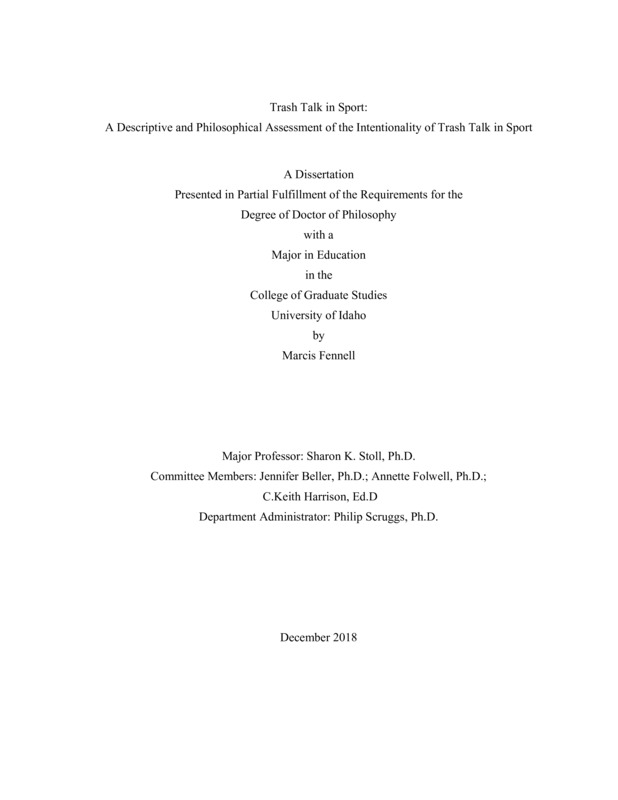Trash talk in sport: A descriptive and philosophical assessment of the intentionality of trash talk in sport
Fennell, Marcis. (2018-12). Trash talk in sport: A descriptive and philosophical assessment of the intentionality of trash talk in sport. Theses and Dissertations Collection, University of Idaho Library Digital Collections. https://www.lib.uidaho.edu/digital/etd/items/fennell_idaho_0089e_11474.html
- Title:
- Trash talk in sport: A descriptive and philosophical assessment of the intentionality of trash talk in sport
- Author:
- Fennell, Marcis
- ORCID:
- 0000-0002-9962-8337
- Date:
- 2018-12
- Keywords:
- Competition Moral reasoning Sport Sport Ethics sport sociology Trash Talk
- Program:
- Movement & Leisure Sciences
- Subject Category:
- Education; Ethics
- Abstract:
-
The purpose of this quantitative descriptive study was (1) to examine metaphysically the empirical and philosophic relationship between the intentionality of trash talk and competitive sport, (2) to develop a statistically valid and reliable instrument to quantitatively describe the empirical relationship between the intentionality of trash talk and competitive sport among current and former athletes with experience playing competitive sport on the High School level or higher. The relationship is assessed across the following factors- Age, Gender, Ethnicity, Highest level of education, Highest level of sport as an athlete, Sport(s), and Hometown. Therefore, the study examines the use of trash talk and its effects on competitive sport through the disciplines of sport ethics and moral philosophy.
Factor analysis procedure was used to provide evidence of statistical validity. We examined the factor structure of the Trash Talk Inventory (TTI) using the appropriate 10 instrument items. The TTI evaluates the moral judgment of participants among competing social values and moral values in competitive sport. Specifically, the TTI evaluates the participants’ moral values within their interpretation of trash talk during competition in sport. The EFA findings revealed a one-factor structure, moral community. This factor affirms the presence of morality within the use of trash talk. Five additional items formed factor 2, Socialized Ethics, which needs further validation. With the addition of Factor 2 to the items of Factor 1, future pilot studies will attempt to validate the TTI-15.
Factor 1 loaded question 1 (.497), question 2 (.721), question 3 (.698), question 4 (.637), question 5 (.627), question 6 (.594), question 7 (.606), question 8 (.655), question 19 (.550), and question 20 (.586). Factor 2 loaded question 14 (.505), question 15 (.702), question 17 (.780), question 21 (.491), and question 24 (-.491).
Using the TTI, 10 items in Factor 1, the internal consistency reliability of measure was .876. A multiple regression was conducted to determine which independent variables (HLE, HLS, SPT, HT, ETH, GEN, AGE) were the predictors of the use of trash talk in competitive sport. Regression results indicate an overall model of two predictors (Gender, Sport) that significantly predict the use of trash talk in competitive sport, R2 = .078, R2 adj = .066, F (6, 489) = 6.86, p = .0001. This model accounted for less than 1% of the variability in the use of trash talk in competitive sport.
- Description:
- doctoral, Ph.D., Movement & Leisure Sciences -- University of Idaho - College of Graduate Studies, 2018-12
- Major Professor:
- Stoll, Sharon
- Committee:
- Folwell, Annette; Harrison, C.Keith; Beller, Jennifer
- Defense Date:
- 2018-12
- Identifier:
- Fennell_idaho_0089E_11474
- Type:
- Text
- Format Original:
- Format:
- application/pdf
- Rights:
- In Copyright - Educational Use Permitted. For more information, please contact University of Idaho Library Special Collections and Archives Department at libspec@uidaho.edu.
- Standardized Rights:
- http://rightsstatements.org/vocab/InC-EDU/1.0/

